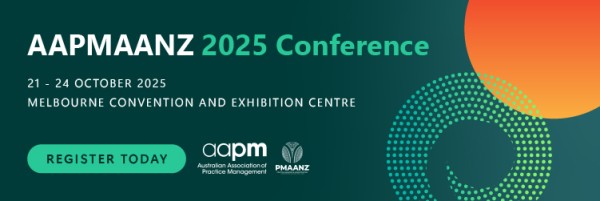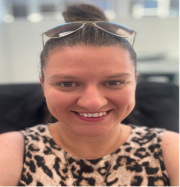Newsletter
Sections
A word from our Secretary | Carol Neki A word from our Chair | Mary Morrissey Strengthening Healthcare Management: The Connection Between AAPM and PMAANZ Welcome to our new members! Former Refugees’ Experiences of Healthcare and Medicines in Southern New Zealand MAS Healthy Practice | Business Continuity – are you prepared? Quality in Practice Conference Update | Jen Kaponga Membership Update | Karen Greer Education Update | Niomi Fleming Treasurer Update | Wendy Harris Communication Update | Roshan Fernando Healthify He Puna Waiora New Zealand’s Trusted Health Information Platform Getting to know our members Heartfelt Acknowledgments NZ Doctor Read / Newsletters and Publications Movie Reviews - recommended by our members Book Reviews - recommended by our members PMAANZ PartnerseMatters Newsletter - June 2025
A word from our Secretary | Carol Neki
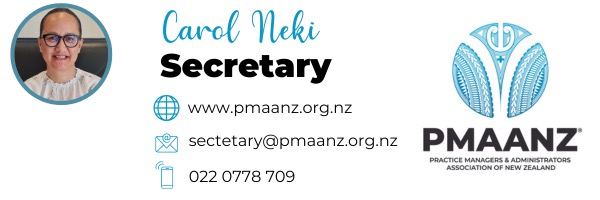
Kia ora PMAANZ members,
The countdown is on for our upcoming conference in Melbourne! Have you registered yet? I know many of you are concerned about the cost and trying to justify the expense, especially when our practices are already facing financial challenges. But let me assure you, you are worth every penny! The education, camaraderie, and resources you'll gain from this conference are invaluable. Personally, this annual event keeps me motivated and inspired. Being surrounded by like-minded peers does wonders for the soul! We make it happen every day for everyone else, so let's make it happen for ourselves!
Discover the challenges and insights surrounding healthcare experiences for refugees in Southern New Zealand. This article provides valuable resources, including videos and practical tips, to help general practices better support refugee patients and improve their care journey.
This issue is packed with essential updates from our chair Mary, along with exciting details about the upcoming Primary Care Awards and the revamped Practice Management of the Year award. You'll also find valuable insights on business continuity planning, success stories from the Quality Programmes team, and information on research funding opportunities. Additionally, we feature personal reflections from members, and resources for diabetes management. We hope you find this edition both informative and engaging.
Ngā mihi
Carol Neki | PMAANZ Executive National Secretary
A word from our Chair | Mary Morrissey
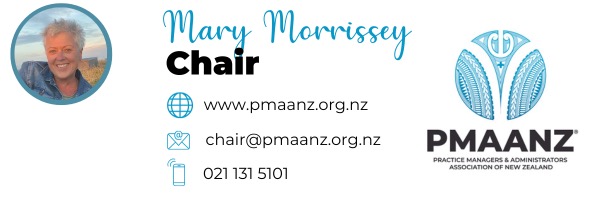
Kia ora koutou katoa
Greetings PMAANZ Members,
Winter appears to have firmly set in, with its grey and miserable days here in Taranaki. I hope those affected by the recent wild weather have not faced significant damage and have managed to dry out.
I am deeply disappointed by the recent changes to the Pay Equity Act. This development means that the current Primary Care pay equity claim will not progress further, necessitating a new claim that meets the revised criteria. Consequently, all the parties must restart the process, leading to further delays in achieving pay equity for our nurses compared to their secondary care colleagues.
The delay in the Capitation Reweighting is another setback for general practice. This initiative would provide funding on a more equitable level for our patients, based not only on age and gender but including ethnicity, rurality, deprivation, and multimorbidity. Reweighting was initially scheduled to begin on 1 July 2025 as part of funding negotiations now underway between the primary care sector and Health New Zealand Te Whatu Ora. However, Te Whatu Ora has confirmed there is currently no timeline for capitation reweighting, with policy work now being led by the Ministry of Health. We remain hopeful for positive news from the PSAAP negotiations regarding our funding levels on the 1st of July.
On a brighter note, the Primary Care Awards will be celebrated at the Gala dinner on September 6th, 2025. These awards promote collaboration and innovation in primary care, showcasing the hard work of primary care practitioners in improving the health and well-being of all New Zealanders and reducing the burden on the secondary care system.
If you missed out on entering those awards, we have revamped our Practice Management of the Year award, which will be presented at our conference in Melbourne. We hope the updated entry form will encourage managers and administrators from general practice and allied health to apply.
Click on the link to check out the new form: https://pmaanz.org.nz/conference/practice-manager-of-the-year/
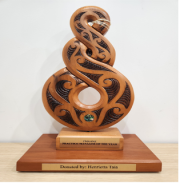
I encourage you to provide feedback to the Executive about what’s happening on the ground in your communities, what is working well and what needs addressing. Your insights are essential for us to focus on the areas and the topics that matter most to the wider membership and workforce, ultimately benefiting our patients. By providing this information, you enable us to present informed perspectives, challenge proposed changes, and offer well-founded recommendations around the tables we are invited to.
Ngā mihi / Kind regards
Mary Morrissey | Chair PMAANZ
Strengthening Healthcare Management: The Connection Between AAPM and PMAANZ
In the dynamic world of healthcare, effective management is the key to delivering quality patient care. A vital component of healthcare practices is the role of practice managers—professionals responsible for the day-to-day operations of medical and allied health practices. The Australian Association of Practice Management (AAPM) and the Practice Managers and Administrators Association of New Zealand (PMAANZ) both work tirelessly to support these individuals, fostering high standards of practice management across Australia and New Zealand.
Though based in different countries, AAPM and PMAANZ share a commitment to enhancing the skills and knowledge of the practice management community, which has led to a meaningful connection between the two organisations.
Shared Mission: Advancing Practice Management
AAPM, founded in 1979, serves as the peak professional body for Practice Management, offering a wide range of services designed to support its members in managing the complexities of modern healthcare practices. AAPM focuses on developing the leadership, business, and operational skills of practice management teams, ensuring they are equipped to deliver excellence in health care practice management.
Similarly, PMAANZ, founded in 1996, provides vital support for practice managers in the country, focusing on delivering training, educational opportunities, and professional development to its members. PMAANZ also advocates for the role of practice managers in the healthcare system, recognizing their critical role in ensuring the efficient and effective running of healthcare practices.
Despite the geographic distance between Australia and New Zealand, both AAPM and PMAANZ share a strong common goal: to elevate the profession of practice management and improve the quality of healthcare services in both regions. This shared mission has naturally led to collaboration and mutual support between the two organisations.
Collaboration for Professional Development
One of the most significant benefits of the connection between AAPM and PMAANZ is the joint conferences, bringing together practice managers from both Australia and New Zealand. This year’s joint conference to be held in Melbourne, from 21 – 24 October, is the ten-year anniversary of the 2015 Hobart joint conference. These events focus on critical issues affecting healthcare practices, such as new healthcare regulations, financial management, patient engagement, and the integration of technology into practice management. The chance to network with peers from both countries allows members to share their experiences, solutions, and challenges, ultimately improving their practice management skills.
Advocacy and Industry Recognition
Both AAPM and PMAANZ are also dedicated to advocating for the recognition of practice managers as essential members of the healthcare team. The role of practice managers is crucial in the smooth running of healthcare practices yet often goes unrecognized compared to clinical staff. Through their efforts, AAPM and PMAANZ work to highlight the importance of practice managers and push for greater recognition and support for their professional development.
The Future of Healthcare Practice Management
As healthcare systems continue to evolve and adapt to new challenges, the connection between AAPM and PMAANZ will play an increasingly important role in shaping the future of practice management. By continuing to work together, the two organisations can share insights on emerging trends, address industry challenges, and offer solutions that benefit practice managers on both sides of the Tasman Sea.
In the years to come, AAPM and PMAANZ will continue to enhance their collaboration, strengthening their global network of practice managers and providing them with the tools they need to excel in their roles. This partnership represents an exciting opportunity to improve healthcare management practices, ensuring that healthcare providers across Australia and New Zealand are better equipped to navigate the complexities of modern healthcare.
Conclusion
The relationship between AAPM and PMAANZ demonstrates the power of international collaboration in the healthcare sector. Through joint conferences, and mutual advocacy, the two organisations have fostered a strong connection that benefits practice managers in both Australia and New Zealand. By continuing to work together, AAPM and PMAANZ will contribute to the continued growth and professionalism of the practice management field, ultimately leading to more efficient and effective healthcare delivery across the region.
Welcome to our new members!
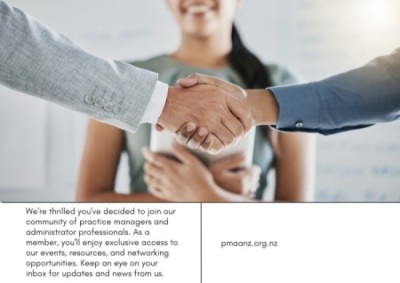
March 2025
- Bradley Fisher - Waikato
- Fiona Osten - Wellington
- Yanhong Piao - Auckland
- Rachael Healey - Otago
- Annette Papanui-McLellan - Wellington
- Karlena Anderson - Waikato
- Jenna Ashby-McLean - Otago
- Nigel Ogilvie - Nelson/Marlborough
- Emma Kay - Canterbury
- Stephanie Buckley - Nelson/Marlborough
- Theresa Hewlett - Canterbury
- Carley Hennings - Waikato
- Renee Storer - Canterbury
- Krupa Mistry - Auckland
- Te Motu Savage - Waikato
- Anisha Lydiard - Waikato
- Jo Reid - Auckland
- Simon Chong - Auckland
April 2025
- Alice Maina - Auckland
- Philippa Castles - National
- Connor Armiger - Waikato
- Marie-Claire Houry - Auckland
- Mark Lee - Waikato
- Kulvant Singh - Auckland
May 2025
- Andrew Beban - Wellington
- Erin O'Gorman - Canterbury
- Sarah Gilmour - Wellington
- Chynelle Williams - Auckland
- Aletta Staal - Auckland
- Amy McCulloch - Waikato
Former Refugees’ Experiences of Healthcare and Medicines in Southern New Zealand
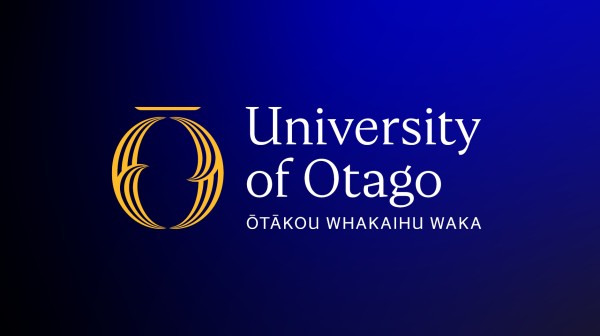
We know that refugees often arrive in host countries, such as Aotearoa New Zealand, with complex health needs. We might not realise they also arrive with expectations of healthcare and understandings of what constitutes care. Through two recent research projects, we explored refugees’ experiences of healthcare and medicines in New Zealand. The first project involved 20 in-depth interviews with refugee households; the second followed 5 refugee households over a year as they utilized healthcare and medicines. Both studies found significant dissatisfaction with New Zealand’s healthcare system and both studies attribute this dissatisfaction, in large part, to refugees’ expectations of care – expectations that were shaped by overseas healthcare systems and norms.
Many refugees arrive in New Zealand having experienced hospital-based health systems, including timely, direct access to specialists. As one refugee said, “That was shocking, that we can’t go directly to see a specialist” while another explained that having to go through a GP for nearly everything felt strange, even futile. “Why we should see a GP first?… If I have a certain health problem, I’m going to see an expert doctor in that field. They wouldn’t let me. They say your GP should send us a letter.”
Before arriving in New Zealand, “healthcare” often meant specialist consultations, physical exams, more frequent tests and procedures, follow-up, and often-times ample medicines. Patel (2022) has called these “positive markers of care.” These actions constituted care in refugees’ previous experience, so the absence of them was sometimes seen as a lack of care. So refugees described leaving GP consultations feelings dismissed and frustrated. This was true even when they had a good relationship with a GP, which many did. They appreciated the warmth and oversight of a good GP, but to them, this still did not necessarily constitute healthcare.
Long wait times for specialist appointments, procedures and tests added to feelings of scepticism and doubt that the primary care system would care for them. Waitlists were not merely seen as a systemic problem for an overburdened system, but rather as a form of neglect.
Communication Barriers
Language and communication issues are also a significant challenge for both health providers and refugees. They described some confusion and inconsistency around interpretation services (such as who books the interpreter or privacy concerns with interpreters). Even when interpretation was going well, it is time consuming, and refugee patients in our study often described feeling rushed. Participants in our studies were often confused about what was going on with their healthcare.
Medicines and Pharmacies: Access and Understanding
For many refugees in our studies, acquiring medications was another challenge. Affordability was particularly problematic for those prescribed unfunded medicines. Communication in pharmacies was another hurdle: Pharmacies do not routinely use interpreting services. Refugees wanted to ask questions in pharmacies but couldn’t. Sometimes family or friends would help but this had its own issues. For example, in one case, the child thought the pharmacist would not have the answers, so refused to ask the parent’s questions. In another case, the child googled the medicine and, worried about the side effects, advised the parent not to take it. There was also confusion about which medicines are funded vs unfunded, over-the-counter vs prescription only.
Resources:
We hope that sharing refugees’ perspectives helps general practice staff better understand refugees’ expectations, which could improve the care experience for both parties. We have created the following 3 resources (free and online):
Video One: Refugees' Experiences of NZ Healthcare: A Summary of 2 Projects
This 10-minute video describes how refugees’ prior experiences with healthcare overseas differs greatly from New Zealand’s primary care system. It also touches on some other challenges and barriers refugees may encounter when accessing healthcare and medicines. Practice managers and administrators have an important role in shaping refugees’ experiences of healthcare—not only through important logistical aspects like booking interpreters or scheduling longer appointments, but also through the warmth and welcome they offer. We hope this video is helpful for gaining a deeper understanding of the broader context refugee patients bring with them.
Video Two: Refugees' Experiences of NZ Healthcare: A Brief Case Study
This 10-minute video is a single case study. Rahim’s story demonstrates how “barriers” to care overlap: language barriers, financial hardship, transportation issues, immigration matters, family separation, trauma, social isolation, cultural differences, employment hurdles, various bureaucratic requirements, and more – all overlap so that even seemingly simple tasks can become incredibly difficult. When combined, these overlapping issues can make even seemingly straightforward tasks—like joining a practice, making an appointment, or filling a prescription - overwhelmingly difficult.
This case study illustrates a few matters that might be of interest to general practice managers and administrators. For instance, patients may not have ready access to things like names, birthdates, contact info. They also may have different naming traditions, contact phone numbers that change frequently or are without credit (many prefer WhatsApp over regular texting and calling). Refugee patients may not be aware of “norms” such as the legal implications of turning 18 in relation to funding or privacy. Even for those who have been enrolled in a practice for some time, it’s important to recognise how complex and compounding these challenges can be. Limited English proficiency might be accompanied by low literacy in their own language can further complicate basic bureaucratic tasks and access to care.
PDF: Quick-Reference Guidance for General Practices Caring For Refugees
We created this resource as short, succinct list of possible “tips and tricks” that may help general practices caring for refugees. It is a compilation sourced from our own research, recent literature and expert input from healthcare professionals.
A few points will be of particular interest to managers and administrators, such as:
- Include reception and administrators in diversity training. Make one admin staff member “a champion” for refugee care. The champion would develop additional expertise and understanding of refugee patients’ needs, expectations, challenges, and strengths. They may, for example, undertake additional training or create resources and share this with the rest of the team.
- Identify “refugee background” patients in your PMS.
- This enables awareness of needs, identification of patterns and creates data for possible funding opportunities. It may serve as reminder to book interpreters or longer appointments, etc.
- However, avoid using the “refugee label” in person. Labels matter. Many patients with refugee backgrounds do not want to be labelled “refugee” for a variety of significant, personal reasons.
- Consider identifying “refugee-like” patients – those who have similar needs/backgrounds but without the official status (i.e., those arriving under family reunification.) They can slip through the cracks. Consider identifying these patients too.
- Remember refugees’ limits in accessing information.
- Many resources (links, printouts about meds) are in English only
- Even translated info is useless to patients who do not read in their 1st
- Remember, pharmacies do not have regular interpretation services.
- Know your region’s or PHO’s funding possibilities.
- There is no uniform approach or funding for general practices with refugee patients. Check with your PHO often for current options.
- Some funding opportunities may not be refugee specific, but could frequently overlap with refugee needs.
- Refugees through NZ talk with each other. There may be confusion about services or subsidies available in one region/PHO but not another.
- Avoid Assumption and a “Deficit Approach.”
- It is incredibly important to avoid a deficit approach to refugees. Approach each as a unique individual and recognize strengths and autonomy too.
- Some refugees feel constrained by the “refugee” label/stereotype or assumptions of trauma.
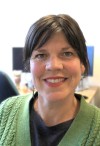 |
Molly George, PhD Social Anthropology, University of Otago For correspondence: molly.george@otago.ac.nz |
|
Professor Pauline Norris Va’a o Tautai – Centre for Pacific Health University of Otago |
MAS Healthy Practice | Business Continuity – are you prepared?

New Zealand by virtue of its nature has the potential for natural disasters, including weather events that cannot be predicted so we do need to be prepared for these events.
It is always wise to have a plan in place before you need the plan. Develop your plan by breaking it down into the areas of responsibility and what are the most important things that are required for you to continue operating bearing in mind that you have a responsibility to:
- your patients
- your staff
- the community
- contractual partners
Not all risks can be eliminated so the best option is to mitigate or minimise them.
What are the most important things that are needed to continue business?
Facilities and access to them.
Resources (Equipment & documentation).
Technology and communications.
Things to consider.
Insurance
- Do you have business interruption cover?
- Do you know what it covers?
- Does it have a stand down period?
- Does it cover loss of earnings?
- How about staff wages?
Communication
Who would communicate with the staff?
Develop a plan and means to communicate with your team. Will you use MS teams or a social media app?
Staff emergency contact details – do you keep a copy off site? These details should include home phone numbers, cell phone numbers and email addresses.
If you have a practice website, can you update this? Could you use this as a communication tool for staff and patients?
Do you keep contact details of insurers, maintenance contractors, utility providers etc, somewhere that you can access off-site.
Facilities
Is there a practice close by that you could develop an agreement with so that you could work from their premises?
Are there other options in the community? e.g. the local community hall.
Resources
IT – Is your network cloud based? If not cloud based, have you tested that your backup would restore your data and that you keep a backup off site? Or do you have an off-site back up arrangement. Do you have a list of software that was installed in each workstation.
Fixed Asset register – To identify all the practice fixed assets.
Equipment – Do you have a list of all necessary equipment in each room, so that if you need to replace it you know what was there?
Stock – Do you know how much stock you have on hand and its value?
Medical suppliers and Pharmaceutical/Vaccine suppliers – Develop a list of your most commonly used contact details and your customer numbers. What are their business continuity plans?
Vulnerable patients
Start to develop a list of your most vulnerable patients, ensure you let the patients know that you are including them on the list and why.
Print out a copy of their ‘front page’ from your PMS making sure it includes an up-to-date list of their medications. Give it to the patient to keep.
Useful resources
The Resilient Business website has downloadable business continuity plans for you to customise for your practice needs.
Remember your plan is a living document and reviewed regularly.
If you have any questions regarding your business continuity plan you can contact our MAS HealthyPractice team at business@mas.co.nz. If you need to review your MAS business insurance covers you can email businessinsurance@mas.co.nz.
Fiona Mines | HealthyPractice Adviser, MAS
MAS staff are happy to answer any questions you have on practice issues or dilemmas. Email your questions to business@mas.co.nz.
This article is of a general nature and is not a substitute for professional and individually tailored business or legal advice. © Medical Assurance Society New Zealand Limited 2025.
Quality in Practice

Travis Medical Centre
The Quality Programmes team ran a promotion that finished in March 2025 in which practices who completed either the Continuous Quality Improvement (CQI) or Equity module accreditation went into the draw to win one of five $700 Amtech Medical vouchers for their practice.
Congratulations to Travis Medical Centre who was one of the prize draw winners. The Royal New Zealand College of General Practitioners communications team caught up with Nurse Nicky to find out about the team’s experience completing the Cornerstone CQI module.
Tell us a bit about your CQI initiative
The CQI initiative we implemented at Travis focuses on improving the care and diabetes management for Māori and Pacific patients living with high HbA1c levels (above 64 mmol/mol). The primary goal of this project is to reduce the health inequities faced by these populations, which are disproportionately affected by diabetes.
To help guide us we followed the Kia Kotahi Partnership in Design framework, which is a flexible, six-step, values-based framework ensuring people and their whānau are at the centre of (re)designing equitable health and wellbeing services in a genuine, purposeful partnership.
A key difference of this co-design framework from eurocentric approaches is its foundation in whanonga pono (values) and it is informed by Te Tiriti o Waitangi. We worked closely with patients and their whānau to develop culturally sensitive, tailored strategies for improving access to care and overall diabetes management. We also used a LEAN methodology and the Triple Aim Framework, which helped us streamline care processes, improve patient experience, enhance population health and reduce health care costs.
What is different for your team because of doing this work?
This initiative has fostered a more collaborative and holistic approach within our team, and we now:
- work together more effectively across disciplines within our Travis team, including doctors, nurses, a health improvement practitioner, health coach, social worker, and also when the patient wants it, we refer them to a culturally appropriate diabetes nurse specialist, which all contributes to a comprehensive care plan for each patient.
- understand the importance of cultural competency and how it plays a significant role in improving patient engagement and outcomes.
- regularly use data-driven decisions to refine our care delivery, constantly seeking opportunities for improvement.
- have learned to be more adaptable in response to patient needs, such as offering flexibility in appointment scheduling or finding creative solutions to logistical challenges like transportation and financial barriers.
- additionally, we have enhanced communication among the team and patients, ensuring everyone is on the same page and that no patient falls through the cracks.
- offer the designed questionnaire to all patients with diabetes to ensure they are offered all the services available to them and a plan tailored to their needs. Our Health Coach is initiating this at the time of recalls.
What’s different for patients?
For patients, the differences have been profound and include:
- Improved access to care: For example, a patient working night shifts who previously found it difficult to attend 8am appointments was offered afternoon phone consultations. This flexibility allowed them to receive care without disrupting their work schedule. We noticed that patients >80 HbA1c weren’t getting blood tests, so we offered in-practice tests, which was much appreciated.
- Culturally relevant support: Māori and Pacific patients now feel more comfortable and understood in the health care environment. Involving whānau in consultations and having Māori or Pacific health care professionals available has improved trust and engagement. One patient shared that the presence of a Māori diabetes nurse made them feel more at ease discussing their health.
- Tailored diabetes management plans: The focus on individualised care has led to better outcomes. For instance, patients with high HbA1c levels (above 64 mmol/mol) received personalised care plans, including education on diet, medications and lifestyle changes, leading to better glucose control and reduced complications.
- Holistic support: A patient facing financial challenges was able to access support from a social worker, who helped them with transportation costs for medical appointments and funded scripts. Additionally, home visits were arranged for those who couldn't attend the clinic, ensuring that diabetes education and monitoring were still provided.
You can read the full article on GP Voice
RNZCGP research funding open
Applications for the College's second of three funding rounds are open. This funding is available to support research and education that benefits general practice, rural general practice, and rural hospital medicine.
Grants are typically in the range of $5,000 - $20,000 for individual applications, although up to $40,000 can be awarded. Applicants do not need to be doctors or members of the College to apply so please pass this on to your peers or colleagues who may be interested.
Applications are open until Wednesday 25 June and will be considered by the College's Research and Education Committee (REC).
View the guidelines, terms of reference and application form
|
Simone White Senior Communications Advisor, RNZCGP |
Conference Update | Jen Kaponga

Hi everyone,
It's hard to comprehend that June is at our doorstep; it's officially winter, with May having been a mixed bag for us all.
We are delighted to invite you to the AAPMAANZ Conference, taking place in Melbourne from Tuesday, 21st October, to Friday, 24th October 2025.
October will be here before we know it! Registrations are open, and cheaper airfares are available; we are excited to share that the planning is well underway for what promises to be a fantastic event. Our programme will soon be available on the website, featuring a stellar lineup of speakers, insightful sessions, and numerous networking opportunities.
We hope you will join us for this valuable event and connect with our Australian whānau.
Waiho i te toipoto, kaua i te toiroa
The importance of keeping connected, maintaining relationships that keeps us moving forward together.

Ngā mihi
Jen Kaponga | PMAANZ Conference Convenor
Membership Update | Karen Greer
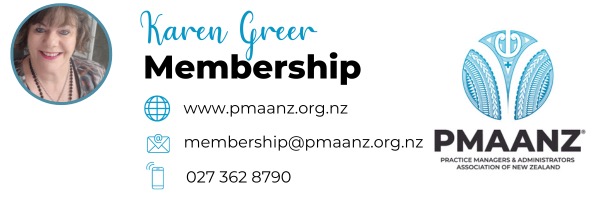
Tena Koutou.
After reading our Newsletter last month, I thought Wendy had a point about improving myself by 2%. So, my 2% this month is to read my book for 15 minutes a day. I am keen to read but always seem to have something else to do, so this is my mission.
I attended the National Rural Conference in Christchurch recently. After a wet start to the day on Thursday, the sun shone for the rest of my stay. It was great to see some of our hard-working PMAANZ members. Also, there were some amazing speakers. I must admit I did come home with some great information that I can use at our practice and some great learning tips.
RE: PMAANZ information. We have 521 members at this moment. It’s great that we are always adding new members. If you have any questions, please do not hesitate to contact me anytime. Being a Practice Manager can be quite daunting when you start, so don’t hesitate to contact me or anyone on the messenger page. Also, don’t forget to download your Practice Managers Manual Template; this is quite helpful.
Have a great next couple of months, and try not to work too hard.
Ngā mihi / Kind regards
Karen Greer | PMAANZ Membership
Education Update | Niomi Fleming
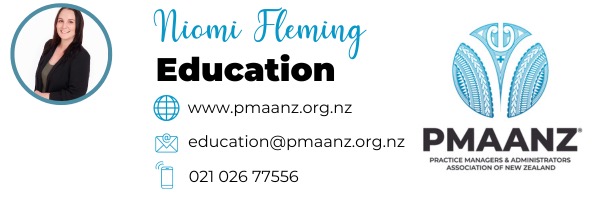
We’re thrilled to celebrate some recent achievements within our PMAANZ community—congratulations to Angelica Harker, Navdeep Kaur, and Vaelei Ala for successfully passing their KASF Bronze paper! This is a fantastic milestone in their professional development, and we’re proud to support their continued growth.
Looking ahead, we’re excited to host Alana Segnit from the University of New England for a webinar on Wednesday, 19th June at 12:30 PM. Alana will walk us through the Practice Manager Diplomas available to PMAANZ members, as well as share a range of cost-effective course options that will help build and support your education portfolios. There will even be some great learning opportunities tailored to admin staff, so be sure to spread the word among your teams.
Scholarship applications are now open! Head to our website to apply for a chance to win one of the following:
- One KASF Bronze paper
- One KASF Silver paper
- One UNE Partnerships Diploma
This is a great opportunity to access professional development support—don’t miss out!
Go to our website for more scholarship information: https://pmaanz.org.nz/education/scholarships/
And as the colder weather settles in, here’s a little something to warm your kitchen and your soul—Delish’s Marry Me Chicken is a hearty, comforting dish that’s perfect over mashed potatoes or pasta. Find the recipe here: https://www.delish.com/cooking/recipe-ideas/a46330/skillet-sicilian-chicken-recipe/
Niomi Flemming | PMAANZ Education
Treasurer Update | Wendy Harris
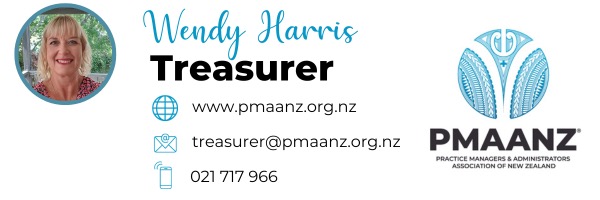
I recently had the opportunity to represent PMAANZ on an exhibitor's stand at the National Rural Health Conference in Christchurch. As a Practice Manager in an urban practice, it was a great experience to meet people who could offer valuable perspectives on delivering resilient, patient-centred care in often challenging, significantly underfunded, and isolated environments.
Rural and remote communities face unique healthcare challenges not often experienced within urban practices: geographic isolation, limited access to specialist services, and workforce shortages, to name a few. These challenges demand innovative, adaptable models of care, so I take my hat off to all my rural practice manager colleagues who, day after day, consider new and innovative ways to deliver quality health services to their communities.
It was a bit of a mission to even get to the conference. I had been watching the weather forecast the day before, predicting a significant storm with high winds and torrential rain in the Canterbury region. I woke in the morning to find my flights had been cancelled as I was transiting through Wellington, and they had 140km an hour wind gusts. I spent the next three hours on the phone trying to reschedule my flights and all the extra baggage I had for the exhibition stand, but I managed to get on the last flight out of Hamilton directly to Christchurch. All was well until I was driving to the airport, and a state of emergency was declared in Christchurch due to significant flooding, so I was unsure whether my flight would even take off. Luckily, I got there in one piece, had an amazing taxi driver help me with all the extra bags and arrived safe and sound. Karen had arrived earlier in the day and had battled heavy rain, getting very soggy in the process, to make sure we were registered at the conference, and our accommodation was warm and cosy.
In many ways, it felt a little like what many rural practices face on a regular basis: storms, both literal and figurative, unplanned adversity, last-minute changes, reliance on others to make it all work, resilience, and above all, a positive mindset to get through each day with whatever challenges it may bring.
Kia kaha rural practices.
Wendy Harris | PMAANZ Treasurer
Communication Update | Roshan Fernando
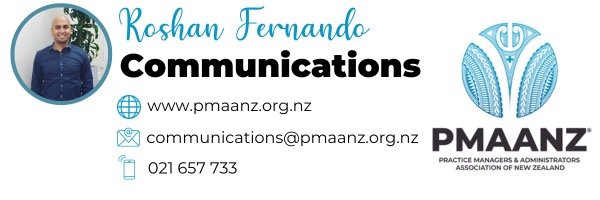
Upcoming Webinars: Enhance Your Knowledge
Mark Your Calendars for Exciting Learning Opportunities
We are delighted to announce our upcoming series of webinars, designed to provide invaluable insights and support professional growth. Whether you're interested in education, recruitment, or cyber security, there's something for everyone!
Webinar Schedule
- June 19th: PMAANZ Education and Scholarship – Explore opportunities for advancing your career through education and scholarship initiatives.
- July 3rd: Conducting a Recruitment Process – Learn effective strategies for managing recruitment processes and selecting the right candidates.
- August 21st: Cyber Security – Stay informed on the latest trends and practices to safeguard your systems and data.
Get Involved
Do you have suggestions for future webinar topics? PMAANZ welcomes your ideas! Please email your recommendations to communications@pmaanz.org.nz.
Don't miss these exciting opportunities to learn and grow. Register today and take advantage of PMAANZ's commitment to professional development!
Roshan Fernando | PMAANZ Communications
Healthify He Puna Waiora New Zealand’s Trusted Health Information Platform
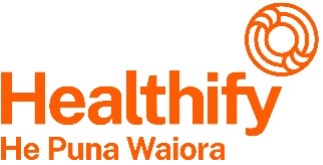
Taking Control of Diabetes: Empowering Patients Through Knowledge
Diabetes resources
Patient and whānau knowledge and understanding about diabetes is essential for effective disease management and prevention of complications. Well-informed patients are more likely to stay on top of their blood glucose levels, take medications as prescribed, maintain a healthy diet, and keep active. Education also helps people make informed decisions about their health, notice symptoms early and reduce the risk of serious health problems like heart disease, kidney damage, and vision loss.
As diabetes care continues to evolve with new medications and technologies, access to trusted, easy-to-understand resources becomes even more important.
Several New Zealand-based organisations provide excellent resources to help people living with or at risk of diabetes learn more about this condition. Here are some great places to start:
The Healthify website and app offer an extensive range of patient-friendly resources covering all aspects of diabetes care. Key areas include:
Types of diabetes and prediabetes prevention
- Type 1 diabetes
- Type 2 diabetes
- Gestational diabetes
- Prediabetes prevention and screening.
Diagnosis & monitoring
- Understanding HbA1c
- Home blood glucose testing for type 2 diabetes
- Sick day plans for type 1 and type 2 diabetes.
Lifestyle and self-care management
Complications
Medicines & technology
- Individual medicine webpages for all medicines used to treat diabetes, for example metformin, empagliflozin, empagliflozin and metformin (Jardiamet®). For the full range, click here.
- A dedicated section on the website for insulin related topics.
- Information on CGMs, insulin pumps, blood glucose test meters, and dual blood glucose/ketone meters.
Multilingual support
- Medicine factsheets for empagliflozin and liraglutide available in English, Te reo Māori, Samoan, Tongan, and Chinese.
- Type 2 diabetes brochure available in nine languages.
- Videos for empagliflozin and liraglutide in English, Te reo Māori and New Zealand Sign Language. Samon and Tongan captions available.
Helpful apps
- Diabetes management apps for type 1, type 2, and hypoglycaemia.
- Medicine adherence apps.
- Mental health and wellbeing apps as concurrent depression and anxiety are common in diabetes.
Visit www.healthify.nz or download the Healthify app
Diabetes New Zealand has a wide range of resources and services aimed at improving the lives of people living with or at risk of diabetes. Resources include:
- My Diabetes Journey App
- Podcasts, newsletters, recipes, and personal stories
- Resources for young adults
- Pamphlets and education guides.
Aotearoa Diabetes Collective
The Aotearoa Diabetes Collective provides practical hypoglycaemia guides for both type 1 and type 2 diabetes, along with sick day management tips for adults.
Heart Foundation NZ
The Heart Foundation has a Managing diabetes pamphlet, which is available in multiple languages.
Additional resource: Type 2 Diabetes and Me (Australia)
While based in Australia, the Type 2 Diabetes and Me program from the National Diabetes Service Scheme Australia, is a free, online course relevant to New Zealanders. It features 10 short modules on understanding diabetes, balancing blood glucose levels, healthy eating, physical activity, medicines, and emotional well-being. Each module includes videos, resources and practical tips.
Getting to know our members
Hello, everyone. My name is Samantha Malloch, and I am excited to introduce myself as the new Auckland Branch Coordinator for our PMAANZ community.
For nearly 12 years, I have been part of the team at Takapuna Health, where I work as the Administration Supervisor. In this role, I support the daily operations of our busy practice, working alongside our Practice Manager to ensure everything runs smoothly. From overseeing staff and managing schedules to handling budgets, my passion lies in creating efficient systems that allow our healthcare teams to focus on what matters most — providing exceptional patient care.
My journey with PMAANZ began in 2019 when I attended my first annual conference. Since then, I’ve been fortunate to attend each year, gaining valuable insights and connections that have inspired me to become more involved. These experiences have shown me the incredible value PMAANZ brings to practice managers and administrators, fostering both professional development and a strong feeling of community.
Currently, I am also furthering my learning by undertaking the UNE Partnerships Diploma of Leadership in Healthcare Practice, which is helping me grow both personally and professionally within healthcare management.
As Auckland Branch Coordinator, my goal is to strengthen connections within our local branch, support our members, and facilitate opportunities for learning and networking. I am committed to being an approachable and proactive point of contact, ensuring our Auckland members feel supported and informed. Over the coming year, I aim to organise engaging events, promote knowledge sharing, and advocate for the needs of our branch within the wider PMAANZ network.
I am truly looking forward to working with you all, giving back to an organisation that has supported me so well, and helping our Auckland branch continue to grow and thrive.
Thank you for the opportunity — I can’t wait to see what we achieve together!
Auckland Branch Chair/Co-ordinator: Samantha Malloch
Heartfelt Acknowledgments
We just wanted to give a huge shoutout to Fiona Mines, for all the awesome work she has done for our members' newsletter over the years. Her articles from MAS on important business topics have been super informative and really inspiring.
Fiona, your dedication to sharing engaging and insightful content has made a big difference to our community. Your expertise and passion for business have given us so much valuable knowledge and practical advice that we’ve come to depend on.
As you retire, we want to thank you for your constant commitment and amazing work. You've made a real impact, and while we’ll miss your fantastic contributions, we wish you all the best in this new chapter of your life.
We would also like to extend our sincere gratitude to Iain Watkins, who has diligently chaired the Auckland Branch for over six years. We appreciate everything you have done and wish you all the best as you now take the time to put your feet up and relax. Thank you for your years of dedicated service.
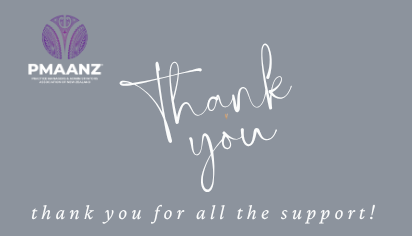
NZ Doctor Read / Newsletters and Publications
![]()
We are always adding to the page of NZ Doctor articles, click the link.
We also have publications that might be of interest to you, click the link.
To read our Partner newsletters which might be of interest, click the link.
Movie Reviews - recommended by our members
 Unstoppable
Unstoppable
Born with one leg, Anthony Robles defies expectations to become a champion wrestler in college, competing against the very school that rejected him.
This is an awesome movie on PRIME called “Unstoppable”. The challenges this man has had to go through is a huge eye opener.
This is a true story, not only about Anthony overcoming his disability, but of his Mother Judy, breaking the chains of feeling helpless in her dysfunctional and broken marriage. Her building herself up to draw strength from within and from
 NETFLIX Formula 1
NETFLIX Formula 1
Well, I am not really into Racing, I normally find something else to do, but, and it is a big BUT, I got hooked on this series while visiting our daughter in Masterton. I was forced to watch this one night and I got hooked. These young men have started go carting whilst little lads and end up continuing to race into manhood. The speeds and pressure these young men are dealing with is astonishing. I would recommend having a look and making your own mind up on this series.
Karen Greer
 Netflix - The Life List
Netflix - The Life List
A young woman embarks on a journey of self-discovery, working through a list of goals she wrote as a teenager, at the request of her late mother. As she navigates the messy process of her second coming-of-age, she confronts her grief while finding the courage to live fully again.
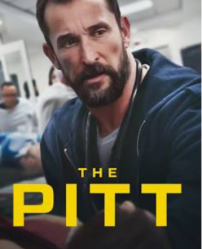 NEON series - The Pitt
NEON series - The Pitt
With each episode set over one hour of one gripping 15-hour shift in the ER, The Pitt examines the challenges facing healthcare workers in today's America, seen through the lens of a modern-day hospital in Pittsburgh.
Book Reviews - recommended by our members
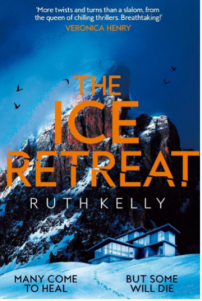 The Ice Retreat - Ruth Kelly
The Ice Retreat - Ruth Kelly
The Ice Retreat is a spine-tingling thriller set in the world of controversial wellness treatments. Meet Hollie Jenson, presenter of the smash-hit docu-series Bad Medicine, which exposes the perils of extreme therapies. Her next target: a new retreat run by wellness guru Ariel Rose, who claims to have discovered the secret to healing pain through her three-day ice rebirth treatment. LIAR?
 A Killing Cold - Kate Alice Marshall
A Killing Cold - Kate Alice Marshall
When Theodora Scott met Connor—wealthy, charming, and a member of the powerful Dalton family—she fell in love in an instant. Six months later, he’s brought her to Idlewood, his family’s isolated winter retreat, to win over his sceptical relatives. Theo has almost no recollection of her earliest years, but now she begins to piece together the fragments of her memories. Someone here has a shocking secret that they will do anything to keep hidden, and Theo is in terrible danger. Because the Daltons do not lose, and discovering what happened at Idlewood may cost Theo everything.
PMAANZ Partners
New Zealand Medical Indemnity Insurance
Practice with confidence, knowing we’ve got your back.
World-class indemnity insurance from Kiwis who go the extra mile to protect your wellbeing - click on the logo image to go to their website for more information.
Become a Member!
If you would like to become a member of PMAANZ, you can complete our online application form. Sign up here!
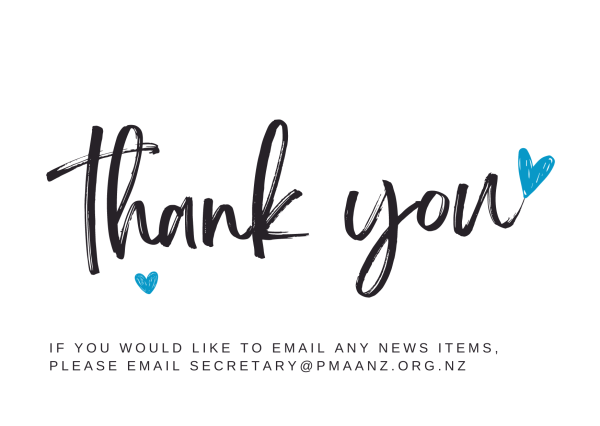


PMAANZ Administrator
PO Box 92 004
Faringdon
Rolleston 7650>
